The 2010 Report of the Bloody Sunday Inquiry, headed by Lord Saville of Newdigate, singled out for criticism Lt Colonel Derek Wilford who had been the Commanding Officer of the 1st Battalion The Parachute Regiment [1 PARA] some of whose soldiers had opened fire in the Bogside in Londonderry on the 30 January 1972 resulting in 14 deaths and a number of wounded.
Saville criticised Wilford for two main reasons; he had ordered his troops into the Bogside to arrest rioters without the specific orders of his superior officer and he had pre-warned his men that the Bogside was a very dangerous area and they could expect to be fired upon by both factions of the IRA, the “Officials” [OIRA] and the “Provisionals” [PIRA].
An oft-overlooked fact is that Saville did accept that the Paras had been fired on from a number of different locations but he did not accept that any of the persons killed or wounded had been handling weapons or blast bombs when they were shot.
Wilford and his 1 PARA were at the time on a 20-month posting in Palace Barracks, Holywood, outside Belfast, acting as reserve battalion for the city and as such were deployed on operations and violent incidents almost daily. Very few men in the battalion had not already been under fire and they were the most experienced operational battalion in the Army at that time. They were disciplined and tough and had a reputation for aggressive action against rioters and making arrests in even the most violent of circumstances.
The situation in Derry on the last Sunday of January 1972 was serious. Large areas of the city were No-Go areas controlled by PIRA and weak police and army leadership in the preceding months had permitted pro-PIRA youths to indulge in daily rioting during which business premises and buildings on the approach from the west had already been put to the torch.
Three days earlier PIRA had murdered a Royal Ulster Constabulary [RUC] Sergeant and a Constable, one a Roman Catholic and the other a Protestant and badly wounded three Constables just a few hundred yards from the scene of the subsequent action. The killings were claimed in PIRA circles by Martin McGuinness using his favoured personal weapon, a Thompson Sub Machine Gun [SMG]. Lord Saville heard that the MI5 agent, code-named “Infliction”, reported that McGuinness had personally told him that he feared that he had started the tragic events of the day by firing the first burst from his Thompson SMG.
This report was effectively ignored by Lord Saville in his summing up and many were astounded by Saville’s conclusion that the bursts of very distinctive Thompson fire, reported by many people, locals and well as soldiers, was in fact “rotor blade slap” produced by a helicopter flying overhead. On the day a demonstration march against the introduction of internment without trial [not a “civil rights” march as is often reported] had been organised and both the organisers and the RUC knew that the endgame would be serious rioting. The Northern Ireland Government banned the march but the organisers were undeterred and went ahead.
At that time the Army and not the RUC were responsible for law and order in the Province and the Commander Land Forces [CLF] was appalled at what was happening with regard to the daily rioting and destruction. He decided that he had stop the passive nature with which the troops stood and took punishment from petrol bombs, rocks and other missiles and rarely made arrests and placed rioters before the Courts.
This was the reason he deployed Wilford and his 1 PARA from Belfast. Towards the end of the march, as predicted, rioting broke out and the opportunity was ripe for the operation as envisaged by the CLF to arrest a large number of rioters. Wilford correctly assessed the right moment to trigger the arrest operation but the Brigadier, far from the action and supported by an irresolute police commander, declined to give the order and refused even to speak on the radio to the 1 PARA Operations Officer who was pleading with him, at Wilford’s behest, for a decision to go. The Brigadier later claimed that he was not dithering but was waiting so as to ensure that there was separation of the rioters and the peaceful marchers although Wilford’s supporters would claim that this was a post event excuse, had never been conveyed to anyone at the time and in any event there were no peaceful marchers involved in the riot. Wilford eventually took it upon himself to order men of his Support Company, and later C Company, to enter the Bogside and effect arrests and that is when the shootings of civilians occurred.
When it became clear that civilian casualties had occurred Wilford found it hard to believe that his disciplined and experienced paratroopers would simply start shooting innocent civilians, after all they had been in similar situations dozens of times and had never previously done so. He remained loyal to his men to the end of his life convinced that it was IRA firing which triggered the response and confusion which followed.
Derek Wilford was born on the 16th of February 1933 in Leicestershire. He was born out of wedlock, his mother having been in service and he never knew his father. He was raised by his mother’s parents and for many years believed that his Grandparents were his parents and that his mother was his sister. His school fees and generous Christmas presents were paid by an anonymous benefactor.
Attending school in Loughborough, where many of the teachers were away at the war, he excelled at Latin and Greek, acted in Greek plays and Shakespeare, claimed the School Prize and in his final year was declared Victor Ludorum. He applied and was accepted for a place at RADA but eventually declined the offer.
Called up for National Service in 1952 he went to Eaton Hall in Cheshire for officer training and was commissioned into the Leicestershire Regiment.
The following year he was posted to Malaya where the Malayan Emergency [1948 – 60] was under way and was seconded to the 5th Battalion of The Malay Regiment. He quickly became a fluent Malay speaker and formed a high opinion of the Malay soldiers who were brave and very quiet when moving in the jungle. He took part in numerous jungle patrols which typically lasted between 7 and 14 days and with his Malays he was involved in several successful actions against the Communist Terrorists [CTs] resulting in the deaths and capture of a number of them. He then volunteered to do a second two-year tour with the 7th Gurkhas.
The CTs could be vicious opponents and often carried out unspeakable atrocities against local people. Wilford well knew this but perhaps an early illustration of his humanity was that he always regretted that anybody had to be killed. It was during that time that he rescued an orphaned Gibbon whom he called Wendy. They became inseparable, with Wendy often accompanying Wilford on jungle patrols and acting as an extra sentry at night.
Upon return from Malaya he attempted to keep Wendy but quarantine laws obliged him to place her in a zoo near Lincoln.
Wilford then served in Cyprus during the EOKA troubles and on operations in the Arabian Peninsula.
In 1960 he was briefly in the newly formed East Anglian Regiment before transferring to 22 Special Air Service Regiment [SAS] where he stayed for three years doing spells on operations, as Adjutant and as a liaison officer with the United States 7th Special Forces in Fort Bragg, North Carolina. Here he worked with Captain Charles [Charlie] Beckwith, later the founder and first commander of the US DELTA – equivalent to the SAS and Wilford focused upon imparting his experiences in Malaya and on the selection and training of special forces troops
It was not until 1977 that the US activated DELTA Force and its first commander was Charlie Beckwith. Wilford and Beckwith remained close until Beckwith’s death.
While serving with the SAS in Malaya, he led a high-risk Search and Rescue operation to recover a Captain John Tadman who’s Auster aircraft had crashed into the jungle, in an area known to be dominated by insurgents. Tadman was severely injured. After 2 days in the deep jungle, they reached the scene of the crash just as the insurgents were closing in. It took a further 4 days to recover Tadman to a safe extraction point.
After attending Staff College where he was one of the top three students, all of whom had served in the SAS, he was appointed Brigade Major of 2 Infantry Brigade. He was subsequently approached by The Parachute Regiment and offered command of ‘D’ Company of the 2nd Battalion [2 PARA]. March 1969 found him on the Caribbean island of Anguilla on Operation Sheepskin, a short-lived and non-violent operation which restored British rule on the island. One officer remembers him sitting outside his tent reading Latin poetry in the original text. Later he took D Company to Northern Ireland on 2 PARA’s first Operation Banner tour before being promoted in 1971 to Lt Colonel and command of 1 PARA in Palace Barracks.
Four months after the events in Londonderry Wilford took his men back to Aldershot for several weeks of intensive re-training before they were unexpectedly summonsed back to Belfast in July for a further four months on Operation Motorman, the operation designed to re-establish control over the No-Go areas in the Province. The CLF specifically asked for 1 PARA in case Motorman went badly wrong and resulted in serious public disorder and violence from the PIRA and he needed Wilford and his paratroopers on hand.
In 1973, he took 1 PARA to Cyprus for a six-month United Nations tour before handing over command in November of that year.
Thereafter Wilford served in Nigeria, Australia, South West District and at Supreme Headquarters Allied Powers Europe [SHAPE] in Belgium, where in his spare time he taught painting, but the generals in the Army had by then decided that Wilford was too hot to handle and only one more promotion followed. He retired from the Army in Belgium in 1983 and lived there for the rest of his life.
The consequences of Bloody Sunday for all concerned were profound as they were for Wilford. His career, in which he was fully expected to rise to high rank, was effectively over. The speed with which others in the Army sought to distance themselves did not reflect well upon some. A scapegoat was required and he was it.
Throughout the long aftermath, over fifty years, Wilford bore the consequences with fortitude but they weighed heavily upon him. In part he blamed the pressure for the break-up of his first marriage and he was depressed at not being able to provide for his family in the way he would have wished.
In the words of one senior officer “They needed a scapegoat and Wilford was to be it. He was thrown to the wolves by lesser men who were neither the soldier nor the leader that he was. He was outstanding and they were mostly mediocre and they didn’t like that”.
Derek Wilford was a man of many parts; a scholar, classicist, thespian, a natural soldier and perhaps above all a natural leader with a total grasp of his trade. He exuded confidence. He was a man of action who was equally at home with a palette and canvas or a copy of Virgil or Ovid in the Latin text. He was a soldier who like many great soldiers actually hated war and killing. His men not only admired and respected him, they, it could almost be said, loved him and their loyalty to him was absolute as was his to them. In later years he suffered from Parkinson’s disease which he bore with frustration but without complaint.
He married first Janet Frith and later Linda Nash. He is survived by both and two sons, one of whom also became a Lieutenant Colonel in The Parachute Regiment, from his first marriage and a daughter from his second.
Derek Wilford died on 16 February 2023.
Source:
Courtesy of the Airborne Network.
Read More
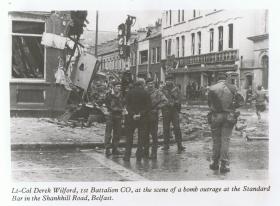
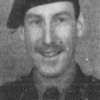
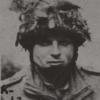
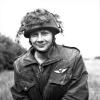
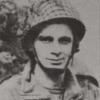
Latest Comments
There are currently no comments for this content.
Add Comment
In order to add comments you must be registered with ParaData.
If you are currently a ParaData member please login.
If you are not currently a ParaData member but wish to get involved please register.